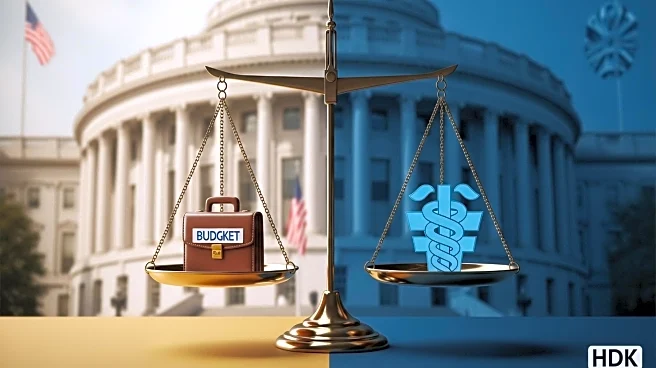What is the story about?
What's Happening?
The federal government shutdown continues as lawmakers remain at an impasse over funding and health care issues. House Speaker Mike Johnson and House Minority Leader Hakeem Jeffries have expressed differing views on the path forward, with Johnson urging Senate Democrats to support a Republican-crafted spending bill. The shutdown has resulted in the furlough of approximately 750,000 federal employees, affecting various services, although essential workers like military personnel and law enforcement continue to work without pay. The Senate is set to vote on a short-term funding bill, but it is unlikely to pass without additional Democratic support. Meanwhile, the House is not scheduled to reconvene until October 13, leaving the Senate to address the shutdown.
Why It's Important?
The ongoing government shutdown has significant implications for federal employees, public services, and the broader U.S. economy. With hundreds of thousands of workers furloughed, daily compensation losses are estimated at $400 million. Essential services continue, but the lack of pay could strain workers and their families. The shutdown also impacts public services, including national parks and aviation, where efficiency may be reduced. The political stalemate highlights deep divisions over health care funding, particularly regarding Medicaid cuts and Affordable Care Act subsidies. The outcome of these negotiations could affect millions of Americans who rely on these programs for health coverage.
What's Next?
The Senate's upcoming vote on the Republican-backed funding bill is a critical next step, though its success is uncertain without bipartisan support. If the bill fails, pressure will mount on lawmakers to find a compromise to reopen the government. The House's absence until October 13 adds complexity to the situation, potentially prolonging the shutdown. Stakeholders, including federal employees, service users, and political leaders, will be closely monitoring developments. The resolution of health care funding disputes will be pivotal in reaching a broader agreement to end the shutdown.
Beyond the Headlines
The shutdown underscores the ongoing political polarization in the U.S., particularly around health care and immigration issues. The debate over health care for undocumented immigrants, although largely symbolic, reflects broader tensions about immigration policy. The shutdown also raises questions about the sustainability of current funding mechanisms for essential services and the potential long-term impacts on public trust in government institutions.















